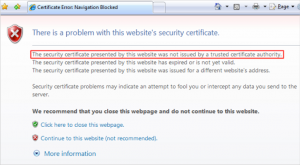It’s no surprise that people like to shop online. Each year, more and more people choose the convenience of buying and receiving items from the comfort of their own homes. For increased spending seasons like the holidays, this has meant greater opportunity for retailers — from large corporations to independent shops — to be in the right place at the right time when customers are ready to make their holiday purchases.
One of the biggest challenges facing online retailers is security. Without the reassurance of a physical retail environment, customers need to feel confident that their billing information will be secure and that a retailer will actually fulfill their orders so their gifts will arrive on time.
To better understand the importance of security, a recent study by Symantec asked thousands of online consumers across Europe and the U.S. questions about their security fears and how this affects their purchases. Their findings indicate that websites need to show that they are secure in order for customers to make purchases.
Online holiday shopping is more popular than ever
Last year, 40% of all holiday shopping occurred online, according to Google. This year, even more customers will make their purchases online.
U.S. eCommerce will grow 16.6% this holiday season [Tweet]
This is even more than the increase in 2014, when online holiday purchases rose by 15.3%. (source). When you also factor in that 92% of holiday shoppers will go online to either research or purchase gifts this season (source), 2015 is shaping up to be the strongest year yet for online retailers.
Security is a top concern
As commonplace as online shopping has become, concerns about cybersecurity have not gone away; in fact, they are still at the forefront of many customers’ minds as they consider making purchases.
43% of people are worried about online security issues when shopping online [Tweet]
Specifically, 20% of shoppers worry about having their payment details stolen, while 19% are worried about identity theft. If a site gives even a slight impression that either of these will happen when making a purchase, customers will take their shopping elsewhere.
Customers won’t buy if site is untrustworthy
If a website does not appear secure, it’s very likely that people will move on to another site that does. This can happen before shoppers even arrive at your website, with 54% of respondents saying they’re not likely at all to go to a website if first seeing a message similar to the following:

Once customers make it onto your site, they can still leave at any point. No matter how sleek your website is or how great a job you’ve done creating a nice shopping environment, minds can be changed well into the shopping experience.
62% of customers have abandoned a shopping cart because they didn’t trust a website [Tweet]
Fortunately, there are proven methods to reassure your customers that your site is indeed secure and that they can trust you with their billing details.
Building trust with SSL certificates
SSL certificates help make your website appear more secure by adding a padlock icon in the address bar. This is very important, as the study found that 61% of respondents check the address bar when purchasing online.
78% of shoppers are reassured when they see a padlock symbol in their browser [Tweet]
Customers might not know what an SSL certificate is, but they will associate seeing a lock icon with security. And when it comes to optimizing your site for eCommerce, every little bit helps.
Get SSL in time for the holidays
With the holidays — and holiday shopping — fast approaching, SSL certificates are more important than ever for providing site visitors with a secure experience. Your customers still have time to delight their end users by encouraging them to make their sites more secure. As mentioned, this can be crucial for online shopping, but any type of website stands to benefit from providing a safer experience as well.
Plus, as an OpenSRS reseller, you probably know that SSL Certificates provide significant margins — so everybody wins! Take a look at our Symantec SSL options.
To see the full study mentioned above, download the infographic here.
